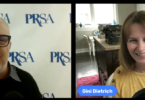During a lesson about puns, alliteration and wordplay in my Art of Storytelling Master Class, a communicator asked, “Don’t you risk confusing people?”
“Well,” I said, “Yes, you do. And that’s part of the point.”
When readers encounter wordplay, they first evaluate the literal meaning of the words. When that doesn’t work, they seek alternative meanings.
However — according to research by Francisco Javier Díaz-Pérez at the Universidad Complutense de Madrid — when readers spend that extra time and attention on a sentence or phrase thanks to wordplay, they understand it better.
And that’s just one benefit of wordplay. Here are some others:
1. Wordplay grabs attention.
Meet your Broca area — the small part of your brain located in the frontal lobe of your left cerebral hemisphere. It’s your body’s language control center.
You can thank your Broca for helping you sort through the data equivalent of 174 newspapers every day, ads included, without having to process every word.
Remember that old Far Side cartoon by Gary Larson?
What we say to dogs: “Okay, Ginger! I’ve had it! You stay out of the garbage! Understand, Ginger? Stay out of the garbage, or else!”
What dogs hear: “Blah blah Ginger blah blah blah blah blah blah Ginger blah blah blah blah blah.”
Your Broca is Ginger. It doesn’t pay much attention to most messages — until something more interesting comes along.
For instance, overused phrases like “a rough day” are so familiar they don’t activate your Broca. Longer elaborations don’t do much either. Why even bother decoding those words into meaning?
But puns and other wordplay do trigger the Broca, according to research by William J. McGuire at Yale University.
2. Wordplay is more fun.
Finding the meaning behind a pun or twist of phrase feels like figuring out a riddle. This is called “the pleasure of the text” — the reward that readers get from figuring out figurative language.
When readers discover the hidden meaning behind your wordplay, according to research by David Glen Mick and Edward F. McQuarrie, they congratulate themselves on their astuteness.
If that twist of phrase tickles your readers’ funny bones, then their brains deliver a dose of dopamine, says WebMD. Then, if you really crack up, neurons called spindle cells spread the joy across the brain.
3. Wordplay changes minds.
The good feeling readers derive from figuring out puns and other forms of wordplay can help put them in an agreeable, open-minded mood — a more receptive headspace to internalize your messages.
In fact, according to two researchers from the California State University at Sacramento, ads that use rhetorical techniques are 166 percent more likely to persuade readers than ads that don’t.
The research also found that ads applying rhetorical techniques are 229 percent more likely to be remembered.
So, there’s the evidence. To cycle back to the initial qualm raised by the communicator in my Art of Storytelling Master Class, it’s possible wordplay may confuse your readers.
But it’s far better to be temporarily puzzled than be forgotten entirely.
Copyright © 2018 Ann Wylie. All rights reserved.
Ann Wylie works with communicators who want to reach more readers and with organizations that want to get the word out. Learn more about her training, consulting or writing and editing services at WylieComm.com. Get more of Ann’s tips at FreeWritingTips.WylieComm.com. Email: ann@WylieComm.com.
Master the Art of Storytelling
Would you like to learn Ann’s full system for engaging readers with corporate storytelling? If so, please join PRSA and Ann Wylie at Master the Art of Storytelling — a two-day Master Class on Feb. 19-20 in San Diego (at the zoo!) PRSA members: Save $100 with coupon code PRSA18. Save $200 when you register by Dec. 31. APRs: Earn four maintenance points.







